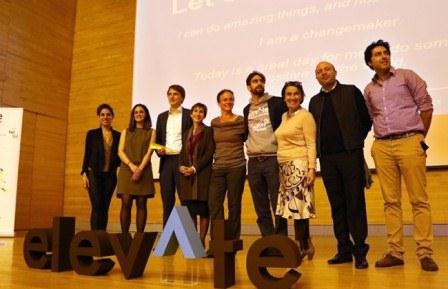
At the closing event for first UNICEF-sponsored social impact startup accelerator, Zakaria Seifeddin began his presentation by recounting a personal anecdote. “I was volunteering at a refugee school when one of the students got measles and infected the other students,” Seifeddin said. “The whole school was shut down.”
What he witnessed two years ago at the Bekaa Valley school got him thinking about an innovative way to help prevent similar incidents.
“A few months later, I took part in a hackathon,” Seifeddin said, referring to collaborative computer coding gatherings among programmers. There, UNICEF representatives explained the hurdles they faced in keeping track of vaccinations and issued a call for help.
Vaxi-Nations, a digital health diary that emerged after over a year of work by Seifeddin and two other young tech talents, was one of seven innovations presented Thursday at the Elevate Impact Accelerator demo event in Beirut.
Startup accelerators are programs that include mentorship and education components and culminate in a demo day, where startups pitch their ideas to prospective investors.
“This is the first accelerator we sponsor globally,” James Cranwell Ward, technologist at UNICEF Lebanon, told The Daily Star.
The development of the first batch of prototypes was sponsored by UNICEF and the Dutch Embassy with the intent of finding innovative answers to some pervasive social problems related to a variety of fields including education, health, water and sanitation.
Cranwell Ward explained that technology has huge potential to help organizations like UNICEF optimize their humanitarian response.
“Technology is everywhere now, even in the populations we serve, because it is their primary communication device with their families back home,” he said.
By tapping into this, mobile applications and other electronic devices can provide real-time data to monitor the needs of the target population and tailor services accordingly.
“This does save money on the field in terms of primary data collection, particularly if we can crowdsource the information,” Cranwell Ward said.
Vaxi-Nations received $20,000 in funding for the first stage of the development, which UNICEF seeks to reinvest in other similar initiatives in future editions of the Elevate Impact Accelerator.
“It is a repayable amount, so we can make that microfinance available to future batches in the future. Having a cost-recovery model was key in order to make [the initiative] sustainable on the long term,” Cranwell Ward said.
Lebanon, as Cranwell Ward put it, provided fertile ground for UNICEF to sponsor its first accelerator because of “its huge tech ecosystem” and the existence of a partner organization – AltCity Impact – who could provide the training.
AltCity Impact, an NGO born in Beirut in 2013 with the goal of developing socially relevant media and entrepreneurial initiatives, provided the expertise to implement the accelerator. “The foundation [of the social venture] was the idea that the problems this region faces are deep, but we have the potential to address them,” Mounir David Nabti, co-founder of AltCity Impact, told The Daily Star.
According to Nabti, AltCity Impact responded to a need to strengthen the link between entrepreneurship and innovation in the country. “I believe everyone is an innovator, an aspiring change-maker or a potential innovator,” Nabti said in the final remarks of the demo event, which was hosted by the American University of Beirut.
Vaxi-Nations, among other startups, was commissioned by U.N. organizations and governmental bodies to take the project a step further. “UNICEF wants to sign a contract with us, and the Ministry of Health expressed interest in integrating our system,” Rami al-Masri, another member of the Vaxi-Nations team, told The Daily Star.
Created to serve the refugee population, the digital health diary is now on track to become a tool used by the Lebanese government too.
The Health Ministry will gain real-time information on what portion of the population has been immunized and which areas are in need of vaccines. The collected data can also be automatically compiled into reports that respond to the needs and complexity levels required by each organization.
Genevieve Begkoyian, a health adviser at UNICEF, said that vaccination cards are often lost or destroyed, especially in contexts of war and displacement. This forces health providers to start vaccinations anew every time the medical history of a child is uncertain.
“Vaccines are preventing the spread of diseases that are killing children. Measles [for example] can kill a child within the onset of a fever,” Begkoyian told The Daily Star. “There is so much need for data taken at the right time, like knowing how much vaccine to [take to the field] and how many doctors are [serving] the population.”
On the user’s end, a mobile app enables each family to receive a notification when vaccinations are due, keep a digital and retrievable medical record and obtain practical information and guidance.
“This also empowers the mother to be able to ask the right question when she goes to the doctor,” Begkoyian said.
The Lifelong Archive of Medical Assessment – a web and mobile platform that records a comprehensive medical history of every user – was also presented at the Elevate Impact Accelerator.
Bildits, an educational toy that replicates the real construction process and cultivates engineering skills in children, won the third prize in a competition of 62 global startups in Copenhagen a few weeks before being launched at the demo event.
Another initiative, KwickSense, was commissioned by the U.N. refugee agency, UNHCR, to produce 300 sensors to monitor temperature drops and water availability in refugee camps across Lebanon.
Source: The Daily Star
 FR
FR EN
EN AR
AR








